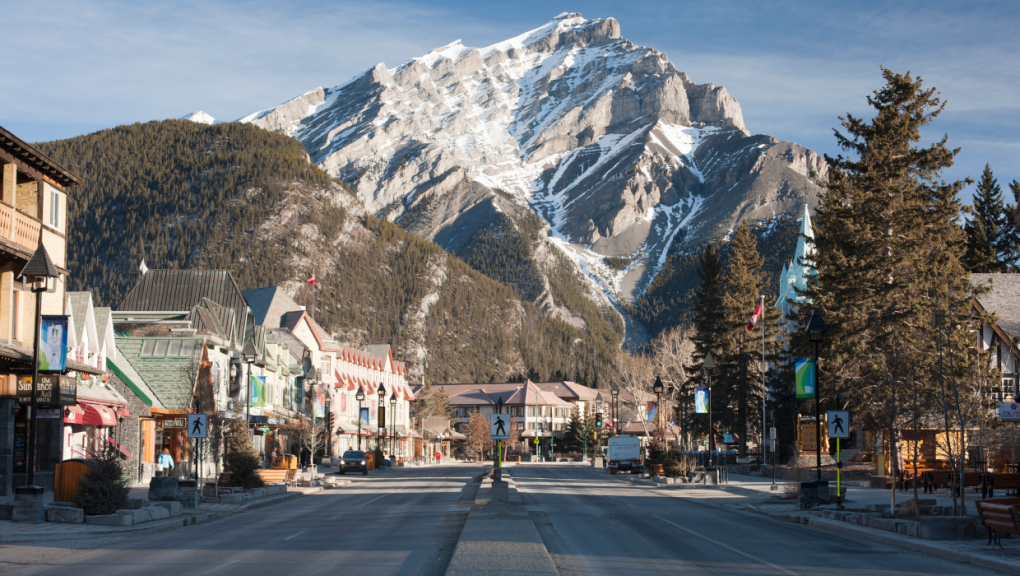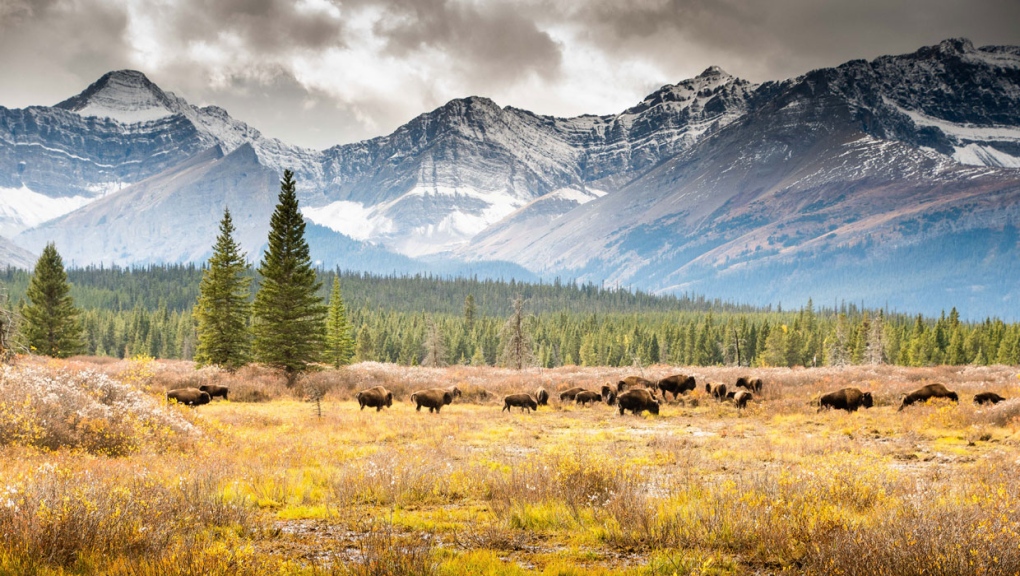Banff National Park plan focuses on climate change, traffic, Indigenous relations
 Early morning in the town of Banff, Banff National Park. (Getty Images)
Early morning in the town of Banff, Banff National Park. (Getty Images)
Canada's busiest national park aims to look for better ways to help visitors get around in the coming years as it works to address climate change and strengthen Indigenous relations.
Those were among the highlights of a 2022 management plan for Banff National Park in Alberta setting the direction for the next decade.
Parks Canada also released plans this week for the other mountain national parks: Jasper and Waterton Lakes in Alberta, as well as Kootenay, Mount Revelstoke and Glacier, and Yoho in British Columbia.
Each maintains a commitment to protect the parks for future generations and has a new focus on climate change and Indigenous relations.
"Canadians expect us to go from talking about climate change to taking some action," said Sal Rasheed, superintendent for Banff, which attracts more than four million visitors a year.
That, he said, includes working with the town of Banff to create a community plan that deals with climate change, bringing in electric or hybrid vehicles as part of Parks Canada's fleet and reducing energy usage in its buildings.
MOVING PEOPLE AROUND THE PARK
Rasheed said there's also a focus on moving people around the park in a more sustainable way as more than eight million vehicles a year pass through -- with at least half carrying visitors.
"Visitation is increasing and we need to pay attention to getting people to the right places in an effective and efficient way."
The 2022 plan has removed a reference to gondolas, which Rasheed said means a proposal for cable cars to the Mount Norquay ski hill from the Banff townsite is off the table.
"We've conducted our homework on it, deemed it not feasible and we're moving on."
The plan doesn't rule out a high-speed passenger train from Calgary, but says twinning an existing rail line could lead to more wildlife deaths in the park, a concern also raised by environmental groups.
Other transportation solutions, he said, could include expanding public transit, particularly to busy areas such as Moraine Lake and Lake Minnewanka.
Rasheed said there's also a focus on Indigenous relations as part of the federal government's reconciliation efforts.
INDIGENOUS ADVISORY CIRCLE
An Indigenous advisory circle was established several years ago and meets several times a year to help guide planning, Rasheed said.
"For example, recently, we've been rethinking how we do cultural burning on our landscape. We are trying to braid Indigenous knowledge into our western approach to fire management."
He said reintroducing bison into Banff's backcountry has also been an important part of reconciliation.
"We partnered with the Stoney Nakoda Nation to manage those bison using cultural learnings," said Rasheed, referring to an Indigenous-led report that says traditional knowledge could help the herd's success.
 Bison are seen in Banff National Park in Alberta in this undated handout image received April 22, 2022. The historic restoration of bison to Banff National Park returns a key native species to the landscape, fosters cultural reconnection, inspires discovery, and provides stewardship and learning opportunities. THE CANADIAN PRESS/HO-Parks Canada-K. Heuer
Bison are seen in Banff National Park in Alberta in this undated handout image received April 22, 2022. The historic restoration of bison to Banff National Park returns a key native species to the landscape, fosters cultural reconnection, inspires discovery, and provides stewardship and learning opportunities. THE CANADIAN PRESS/HO-Parks Canada-K. Heuer
The management plan says the bison reintroduction, a five-year pilot project, is to be evaluated by 2023.
"It's safe to say that we will continue to have bison on the landscape in Banff National Park," Rasheed said of the approximately 80-animal herd. "Exactly how many and what the look of that will be is yet to be determined."
The plan notes grizzly bears, mountain goats, wolves, cougars and wolverines are sensitive and important species for the national park. It says habitat security for those species must be maintained or improved by 2030.
Sarah Elmeligi, national parks program coordinator for the southern Alberta chapter of the Canadian Parks and Wilderness Society, said the plan takes a significant step forward from earlier ones.
"As with all management plans, the devil is in the details," she said. "It really is how the management plan is delivered on the ground."
Overall, though, Elmeligi said it appears to be a good plan, particularly the focus on climate change.
A strategy to deal with busy areas is also important, but should only be a first step, she said.
"It's really important to think about how recreation in the less popular areas is impacting wildlife habitat and connectivity and invasive species and aquatics," she said. "Human use still needs to be managed in those places."
The plan considers new alpine huts where there "are demonstrable, persistent public safety risks."
Elmeligi said CPAWS would be concerned if new commercial huts were built in the backcountry. Any replacement facilities should not be expanded beyond their current footprint, she added.
Rasheed said he takes pride in the fact that Banff National Park is 97 per cent wilderness area.
"We have been very explicit in the management plan that we're not going to have new commercial accommodations in (the) wilderness," he said.
Some of the highlights of the other management plans include: upgrading the popular Lake O'Hara campground in Yoho; working to maintain the caribou population in Jasper and assessing archeological sites in Waterton Lakes after a 2017 wildfire.
This report by The Canadian Press was first published Aug. 27, 2022.
CTVNews.ca Top Stories

W5 Investigates 'I never took part in beheadings': Canadian ISIS sniper has warning about future of terror group
An admitted Canadian ISIS sniper held in one of northeast Syria’s highest-security prisons has issued a stark warning about the potential resurgence of the terror group.
'Absolutely been a success': Responders looks back at 988, Canada's Suicide Crisis Helpline, one year later
In its first year, responders for Canada's Suicide Crisis Helpline, known as 988, have answered more than 300,000 calls and texts in communities nationwide.
Prime Minister Trudeau meets Donald Trump at Mar-a-Lago
Prime Minister Justin Trudeau landed in West Palm Beach, Fla., on Friday evening to meet with U.S.-president elect Donald Trump at Mar-a-Lago, sources confirm to CTV News.
Nova Scotia PC win linked to overall Liberal unpopularity: political scientist
Nova Scotia Premier Tim Houston is celebrating his second consecutive majority mandate after winning the 2024 provincial election with 43 seats, up from 34. According to political science professor Jeff MacLeod, it's not difficult to figure out what has happened to Liberals, not just in Nova Scotia but in other parts of Canada.
'Mayday! Mayday! Mayday!': Details emerge in Boeing 737 incident at Montreal airport
New details suggest that there were communication issues between the pilots of a charter flight and the control tower at Montreal's Mirabel airport when a Boeing 737 made an emergency landing on Wednesday.
Hit man offered $100,000 to kill Montreal crime reporter covering his trial
Political leaders and press freedom groups on Friday were left shell-shocked after Montreal news outlet La Presse revealed that a hit man had offered $100,000 to have one of its crime reporters assassinated.
Questrade lays off undisclosed number of employees
Questrade Financial Group Inc. says it has laid off an undisclosed number of employees to better fit its business strategy.
Cucumbers sold in Ontario, other provinces recalled over possible salmonella contamination
A U.S. company is recalling cucumbers sold in Ontario and other Canadian provinces due to possible salmonella contamination.
Billboard apologizes to Taylor Swift for video snafu
Billboard put together a video of some of Swift's achievements and used a clip from Kanye West's music video for the song 'Famous.'

































